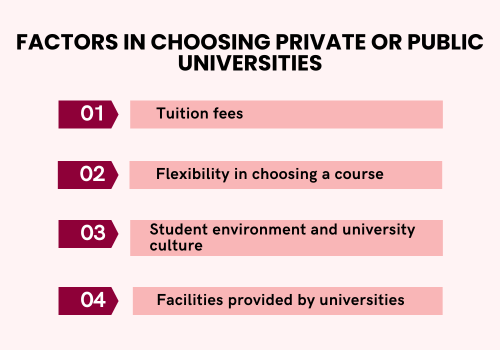Choosing Between Public or Private University in Malaysia: What is your choice?
June 28, 2024
Nurbek J

Summary:
- Tuition fees at public universities are lower due to government funding, but they accept only a limited number of international students. Gaining admission to Engineering, Medicine, Dentistry, and Pharmacy courses is particularly difficult.
- International students can apply for any course at private universities, including high-demand fields like Engineering, Medicine, and Dentistry.
- Public universities have a predominantly Malaysian student population (over 95%?), resulting in a largely Malay cultural environment. Some international students report that lectures are often in Malay, making it challenging for them. In contrast, private universities have a large international student population, and lecturers teach exclusively in English.
- Application process to public universities is slow and there's often a lack of communication.
Malaysia has a rich history spanning decades in international education, emerging as a prominent destination for students worldwide.
It also has garnered acclaim for its commitment to higher education and is recognized as one of the top Asian destinations for international students.
Recent years have seen substantial governmental investment in tertiary education, resulting in modern facilities, groundbreaking research initiatives, and globally recognized degree programs.
Moreover, situated in Asia, a region known for its robust economies and abundant career opportunities, Malaysia offers a compelling environment for academic and professional growth.
This article aims to assist individuals in navigating the diverse educational landscape of Malaysia, empowering them to make informed decisions about their academic pursuits.
Public vs Private University: What is the difference?
In Malaysia, the Ministry of Higher Education (MOHE) oversees matters concerning higher education, including public universities and private higher education institutions.
MOHE strives to effectively implement the higher education delivery system, in line with Malaysia's ambition to become a renowned hub for international higher education excellence. And now, what is the difference between public and private university in Malaysia?
1. Public universities
Public universities in Malaysia offer a range of undergraduate and postgraduate programs. Additionally, some universities provide pre-university foundation and diploma courses - usually through their private arms.
These public universities are classified into three main groups, which are research universities, focused universities, and comprehensive universities.
What sets them apart?
Research universities, established by the national government in 2006, are esteemed public institutions committed to pioneering research and educational excellence.
They receive additional funding specifically allocated for research endeavors.
Comprehensive universities, on the other hand, offer a broad spectrum of academic programs, covering pre-undergraduate, undergraduate, and postgraduate levels.
Focused universities, also part of the public university system, specialize in specific fields such as engineering/technical studies, education, management, and defense.
These institutions customize their programs to meet the unique demands and requirements of their specialized areas of expertise.
2. Private universities
Private universities in Malaysia offer diverse academic programs across various disciplines, catering to the needs and interests of students.
With a focus on quality education and industry relevance, these institutions provide smaller class sizes, personalized attention, and modern facilities.
How do universities in Malaysia conduct their courses?
Universities in Malaysia are recognized for their well-structured and thorough approach to organizing and delivering courses. Here’s how they organize and deliver their programs:
1. Core curriculum
Core curriculum covers a wide array of subjects deemed crucial for a comprehensive education, such as mathematics, languages, sciences, and social sciences.
By including such a diverse range of disciplines, universities aim to provide students with a broad understanding of the world and equip them with the foundational knowledge necessary for success in their chosen areas of study.
Furthermore, the core curriculum serves as a platform for interdisciplinary learning, allowing students to draw connections across different fields of study and grasp the interrelationships between various areas of knowledge.
This interdisciplinary approach enriches students' educational journeys and prepares them to address real-world challenges that often demand multifaceted solutions.
2. Major and elective courses
Major courses are at the core of academic studies, providing a thorough exploration into specialized fields that match students' interests and career goals.
These courses are carefully crafted to ensure students gain a deep understanding of the subject, giving them the knowledge and skills needed to succeed in their chosen fields.
In addition to major courses, students have the opportunity to choose from a wide range of elective courses.
This flexibility allows them to explore topics other than their main area of study, helping them develop additional skills and interests that can benefit their academic and professional journey.
Whether they're learning related subjects or entirely new areas, students can customize their education to suit their individual goals.
Elective courses cover a variety of subjects, spanning from arts and humanities to sciences and social sciences.
This diverse selection encourages students to explore different perspectives and methods of learning, fostering a well-rounded education.
Furthermore, many elective courses incorporate innovative teaching techniques and hands-on learning experiences, giving students practical skills applicable in various contexts.
Also read: Choosing the right university and course in Malaysia
3. Course sequencing and progression
Course sequencing and progression play a crucial role in guiding students throughout their academic journey, ensuring a logical and structured development of their knowledge and skills.
This entails arranging courses in a particular order, often including prerequisites and corequisites, to facilitate a smooth and coherent progression of learning.
At the beginning of their academic path, students typically start with foundational courses that establish the basic concepts and principles needed for more advanced studies.
These introductory courses provide essential groundwork, allowing students to grasp complex topics within their chosen field.
By learning these foundational elements, students lay a strong foundation upon which they can build and explore specialized areas of study.
As students move forward in their academic program, they encounter progressively more complex subjects tailored to their specific field.
These intermediate and advanced courses expand upon the foundational knowledge acquired earlier, enabling students to delve deeper into specialized aspects of their discipline.
This gradual advancement allows students to develop a deeper understanding of intricate theories, methodologies, and practical applications relevant to their field of study.
4. Internships placements
Internship opportunities are commonly integrated into the curriculum of numerous universities in Malaysia, offering students invaluable hands-on experience in real-world professional environments.
These internships, industrial attachments, or work placements present students with the chance to bridge the gap between academic learning and practical application.
Through these opportunities, students gain firsthand insights into industry practices and workplace dynamics.
Moreover, they have the opportunity to establish meaningful connections with seasoned professionals, expanding their professional network and potentially opening doors to future career opportunities.
Furthermore, internships are important in shaping students' career trajectories, providing them with clarity regarding their career aspirations and potential pathways.
Exposure to different organizational cultures and job roles enables students to make informed decisions about their future career directions, thus enhancing their employability and readiness for the workforce upon graduation.
5. Tutor classes and group sessions
Some academic programs like Law or Information Technology (IT), students receive extra support through tutor classes, tutorials, or small group sessions.
These sessions are meant to complement regular lectures by encouraging active discussions, allowing students to learn from each other, and giving them personalized attention from instructors.
In tutor classes, students benefit from the expertise of tutors who specialize in the subject.
These sessions often involve focused discussions, problem-solving activities, and hands-on exercises to reinforce important concepts and improve understanding.
Tutors also provide personalized feedback and assistance tailored to each student's learning needs, helping them grow academically and gain confidence.
Similarly, group sessions allow students to work together with their peers, exchange ideas, and tackle academic challenges as a team.
Through this peer-to-peer learning, students can gain new insights, learn from each other's experiences, and develop crucial teamwork and communication skills necessary for success in their studies and future careers.
6. Credit system
The credit system employed by universities in Malaysia is a structured framework through which courses are assigned specific credit values corresponding to their workload and complexity.
Under this system, each course is allocated a certain number of credits, which reflect the time and effort expected from students to successfully complete the course requirements.
Students are required to accumulate a predetermined number of credits in order to fulfill the requirements for graduation.
This entails successfully completing a variety of courses across different disciplines, with each course contributing a certain number of credits towards the total required for graduation.
7. Assessment methods
Universities in Malaysia employ a diverse range of assessment methods tailored to the nature of the course and its specific learning objectives.
These assessment methods encompass a variety of formats, each designed to measure different aspects of students' knowledge, skills, and competencies.
The most common assessment methods are examinations, quizzes either online or in-class, group projects, and presentations.
These assessments typically evaluate students' understanding of course material, their ability to recall information, explore a certain topic deeper, and their problem-solving skills within a constrained time frame.
What should students consider when choosing between public or private universities in Malaysia?

When deciding between public and private universities in Malaysia, students face numerous factors to weigh. Here are some important considerations to keep in mind:
1. Tuition fees
One of the main differences between attending a public or private university lies in the tuition fees.
Public universities in Malaysia receive government subsidies, which help offset the actual cost of courses.
This initiative aims to ensure that students, particularly those from lower-income families, can access higher education at a more affordable cost. However, they accept only a limited number of international students. Gaining admission to Engineering, Medicine, Dentistry, and Pharmacy courses is particularly difficult.
Conversely, private universities operate without government subsidies, resulting in higher tuition fees.
2. Flexibility in choosing a course
Flexibility in choosing a course at private universities offers a significant advantage for international students.
At private institutions, international students can apply for and gain admission to any course, provided they meet the admission requirements. This contrasts with public universities, where there are strict quotas for international students, making it particularly challenging to gain admission to high-demand courses like Engineering, Medicine, and Dentistry.
This flexibility at private universities allows international students to pursue their desired fields of study without the limitations imposed by public university quotas.
Additionally, international students are encouraged to apply at least three months before the intake date, as visa approval can take between 4 to 8 weeks.
3. Student environment and university culture

The student environment varies significantly between public and private universities.
The majority of students in public universities in Malaysia are locals, while private universities have a denser population of international students.
In other words, private universities offer opportunities to learn in a diverse environment where students from different backgrounds and cultures can interact and exchange cross-cultural knowledge.
As a result of this distinction, both types of universities have distinct learning environments.
For instance, public universities typically use a mix of Malay and English languages in instruction due to the predominance of local students.
Conversely, private universities use English as the medium of instruction, given the significant presence of international students at these institutions.
4. Facilities provided by universities
Public universities generally feature expansive campuses and superior facilities to accommodate a wide range of courses and the large number of local students annually enrolled.
These facilities include amenities like swimming pools, gyms, and libraries; however, maintenance of these facilities may not be as frequent.
In contrast, private universities have more tailored, up-to-date facilities designed to meet the specific needs of their courses. These facilities are serviced more regularly.
Moreover, student accommodation in private universities tends to be more comfortable and spacious compared to public institutions.
How do universities in Malaysia incorporate cultural diversity into their programs?
Universities in Malaysia incorporate cultural diversity into their programs through various initiatives and strategies aimed at fostering an inclusive and multicultural learning environment. Some approaches include:
1. International exchange programs
International exchange programs are highly valued by many universities in Malaysia as integral components of their academic offerings.
These initiatives not only expand students' academic horizons but also foster significant cultural exchange and mutual understanding on a global scale.
Through partnerships with prestigious institutions worldwide, Malaysian universities facilitate opportunities for students to embark on transformative journeys of learning and discovery.
Participating in international exchange programs allows students to immerse themselves in diverse cultural environments, engage with different languages, and gain firsthand experience in various educational systems.
Living and studying abroad enables students to develop crucial cross-cultural competencies, empathy, and adaptability—qualities essential in today's interconnected world.
Additionally, these programs promote meaningful connections and collaborations among students from diverse backgrounds, nurturing a sense of global citizenship and cooperation.
2. Multicultural events and festivals

Universities in Malaysia prioritize organizing various multicultural events, festivals, and celebrations as part of their commitment to embracing diversity and fostering cultural exchange and integration.
These events serve as vibrant platforms to showcase the rich tapestry of cultures represented within the student body, while also providing opportunities for students to immerse themselves in diverse traditions and customs.
These multicultural events often feature an eclectic mix of cultural performances, ranging from traditional dances, music to theatrical performances.
Students have the chance to witness the beauty and complexity of various cultural expressions, gaining a deeper appreciation for the cultural diversity.
3. Inclusive curriculum
Expanding on the concept of an inclusive curriculum, universities in Malaysia strive to create learning environments that not only acknowledge but also celebrate the diverse backgrounds and experiences of their student body.
This commitment to inclusivity is reflected in the incorporation of multicultural perspectives and content across various academic disciplines.
In literature courses, for example, students may explore works by authors from different cultural backgrounds, providing them with insights into diverse literary traditions and perspectives.
This exposure not only enriches students' understanding of literature but also fosters empathy and cross-cultural appreciation.
What should students do when considering two or more university offerings?
Choosing the right university in Malaysia is a crucial decision that can significantly impact a student's future. Several factors deserve careful consideration before making the final choice, such as:
1. Financial considerations

Financial considerations are undeniably the cornerstone of choosing a university in Malaysia.
Public universities, heavily subsidized by the government, boast significantly lower tuition fees compared to their private counterparts. This makes them a highly attractive option for students from budget-conscious families.
However, it's crucial to remember that public universities are highly competitive, and gaining admission can be challenging.
On the other hand, private universities offer a wider range of programs, potentially including specialized fields not readily available in public institutions.
While their tuition fees are generally higher, many private universities also offer generous scholarships and financial aid packages based on academic merit, financial need, or specific talents.
These options can significantly ease the financial burden for students, making private universities a viable alternative.
2. Academic interests
When selecting a university in Malaysia, students should prioritize academic interests as the guiding factor. This helps them navigate the intersection between their passions and the practical aspects of their education.
To start, it's recommended to explore the range of courses available at different institutions. Instead of just looking at program names, students should delve into the details of the curriculum, specific modules, and elective options.
This allows them to identify courses that pique their curiosity and align with their long-term goals.
Additionally, it's essential for students to assess the structure of the programs. They should consider the following checklist:
- Do the programs strike a balance between theoretical knowledge and practical application?
- Do they provide opportunities for internships, research projects, or collaborations with professionals in the field?
These hands-on experiences are crucial for developing essential skills and gaining valuable exposure to real-world scenarios, ultimately providing students with a competitive edge in their chosen career paths.
3. University rankings
University rankings can serve as a valuable tool in the university selection process in Malaysia.
Compiled by various organizations, these rankings attempt to compare universities across metrics such as faculty quality, research output, student satisfaction, and international outlook.
However, it's important to note that university rankings are not the definitive measure of a university's quality.
While a strong ranking may suggest the quality of education offered, it does not guarantee an exceptional learning experience for every student.
Rankings often highlight research output, faculty credentials, and international student enrollment, which may not directly correlate with teaching quality, student support, or career outcomes.
Therefore, it is advisable for students to use rankings as a starting point for further exploration. They should consider the factors emphasized and overall context before relying solely on these rankings for their decision.
For instance, if they are particularly interested in employability, they can explore rankings that emphasize graduate career outcomes or industry partnerships.
4. Cost of living
The location of the university they select plays a pivotal role in shaping both their academic and personal experiences.
Apart from the university itself, it's essential to consider various factors to ensure that the location aligns with their individual preferences and lifestyle.
For those opting for off-campus accommodation, proximity to home becomes a key consideration. Choosing a university close to home can provide a comforting sense of familiarity. When evaluating this aspect, they should assess the travel time and associated costs.
They should carefully evaluate the campus environment and surrounding area too.
Do they prefer a vibrant urban campus with access to city life and cultural attractions, or do they lean towards a suburban campus that offers a more tranquil environment?
Moreover, students should also consider the amenities available on campus, such as libraries, recreation facilities, and student housing.
They should evaluate how accessible these amenities are in fulfilling their daily requirements, particularly if they depend on public transportation.
Furthermore, it's important for them to consider the cost of living in the vicinity. The affordability of accommodation, transportation, entertainment, shopping, and other necessities can significantly impact their budget.
They need to do research on these factors to allow them to maintain a comfortable lifestyle without facing excessive financial strain.
Kickstart your education in Malaysia
We'll help you find and apply for your dream university
You might be interested in...
- Global Learning at the Crossroads: Canada–Malaysia’s Evolving Education Partnership
- How AI is Powering the Next Wave of MSME Growth in Malaysia
- Malaysian Private Universities Making a Mark in Global Rankings
- Benchmarking Malaysian Private Universities Against Their ASEAN Peers
- Step-by-Step Guide to Applying to Malaysian Universities Online in 2025
- Fastest-Rising Malaysian Universities in the QS Rankings (2023‑2025)
- Sunway University Climbs to Global Top 500 in QS Rankings 2026
- Trusted by Top Universities: EasyUni’s Exclusive Visit to Sunway University
- Wawasan Open University and Sophic Automation Partner to Offer Work-Based Learning for Engineering Students
- Sunway University: Malaysia’s Best Cambridge A-Level College with 11 Years of Excellence
 +60173309581
+60173309581





